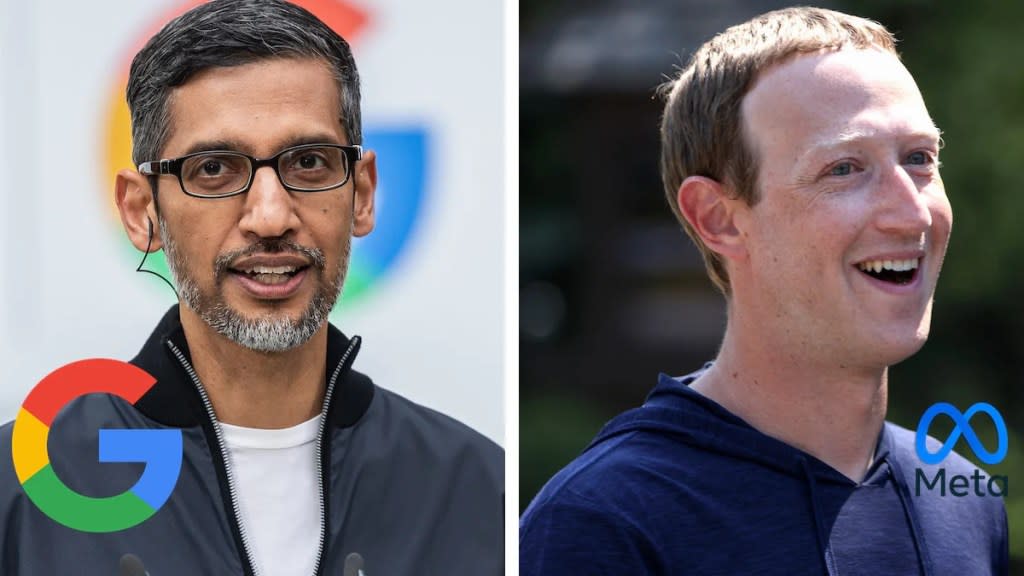AI Dominates Tech Earnings, Highlighting Competitive Advantages | Analysis

If there was ever any doubt that Big Tech is running headlong into the world of AI, this week’s earnings releases from Alphabet, Meta and Amazon underscored the depth of that leap.
In their calls with analysts, tech company CEOs went well beyond a passing mention of AI initiatives. Rather, they seemed to frame the entirety of their business operations through the lens of myriad AI initiatives, which have become front and center in future spending plans.
Everyone seemed to be trying to out-AI each other.
“We’ll do everything that is needed to make sure we are the leading AI models and infrastructure in the world bar none, and we’ll continue driving efficiencies from that,” Alphabet CEO Sundar Pichai said Tuesday.
“How big this is going to be, it’s hard to predict,” Meta CEO Mark Zuckerberg said Wednesday, boasting: “I don’t think that anyone has built what we’re building here.”
Not to be outdone, Amazon’s CEO Andy Jassy said that “every one of our businesses is building generative AI applications to change what’s possible for customers, and we have a lot more to come.”
Jassy called it a “very substantial, gigantic, new generative AI opportunity” that will generate “tens of billions of dollars in revenue” for Amazon Web Services (AWS) for the next several years.
This matters, of course. Alphabet, Meta and Amazon together control more than 70% of digital advertising, sway that continues to roil the media industry. Big Tech’s products feed consumers and businesses alike, including chat boxes and the underlying code they are investing tens of billions of dollars to develop. Hollywood studios and streamers could use the fruits of those efforts to build their own customized AI products they could then directly apply to film production, and potentially exploit the labor and likeness of writers and actors in ways they fear — and which have led them to the picket lines.
For now, as they battle accusations by the U.S. Justice Department of anti-competitive behavior, Alphabet and Meta are focused on the shiny new car in the garage. The Big Tech firms have been rushing to optimize and incorporate their AI’s assistants — Google has Bard and Meta now has Meta AI, their answers to OpenAI’s ChatGPT —into everything they make and do, executives said, from hardware to software to business messaging, and to their advertising products.
Remember that sexy thing in the driveway called the metaverse that inspired Facebook founder Zuckerberg to rename his company… Meta? It has taken a back seat to AI. Zuckerberg said Wednesday that AI, in particular generative AI, will be Meta’s “biggest investment area in 2024, both in engineering and compute resources.” The company is continuing to “de-prioritize a number of non-AI projects” in order to “shift people towards working with AI,” he said.
Alphabet, for its part, continues to “invest meaningfully in the technical infrastructure needed to support the opportunities we see in AI” and expects “elevated levels of investment” in Q4 and “continuing to grow in 2024,” said Ruth Porat, Alphabet’s CFO.
Beyond chat boxes, Big Tech executives discussed how they are already using AI to measurably boost their advertising businesses — in part by automating more ads, requiring less human activity.
Despite a tough advertising climate for many companies, Alphabet and Meta both reported improved advertising revenue this quarter. Meta booked $33.6 billion in ad revenue in Q3, up 24% year over year (21% on a constant basis). Google’s advertising revenue grew 9% to $59.65 billion in the quarter, compared to Q3 of 2022.
For Meta, AI tools for advertisers are “driving results,” with Advantage+ shopping campaigns (which use machine learning to scale ads), reaching a $10 billion run rate, with more than half of Meta’s advertisers using its Advantage+ creative tools to optimize images in text and their ads creative, Zuckerberg said. Nearly 80% of Alphabet’s advertisers already use at least one AI powered search ads product, said Philipp Schindler, Alphabet’s chief business officer.
“It’s going to change advertising in a big way, and make it so much easier to run ads,” Zuckerberg said. “Businesses that basically before would have had to create their own creative or images now won’t have to do that, they’ll be able to test more versions of creative, whether it’s images, or eventually video or texts. That’s really exciting, especially when paired with the recommendation AI.”
From Q2 to Q3 the number of active generative AI projects on Alphabet’s Vertex AI, an enterprise solution for big companies, grew seven-fold, among them health care company Highmark Health, Alphabet said Tuesday.
Alphabet executives talked about how the company is using Google AI to translate content into multiple languages, flip and trim existing assets, remix uncut videos and even to identify trending content around major cultural moments or brand sponsorship opportunities.
As if we needed it, AI is also helping keep more eyeballs glued to social media apps. This year Meta has seen a 7% boost in time spent on Facebook and a 6% increase on Instagram, because of AI-driven feed recommendations, Zuckerberg said.
Meta is hardly forgetting about the metaverse. The company continues to double down on research and development, reporting on Wednesday that its Reality Labs division, which focuses on augmented and virtual reality initiatives, booked a $3.7 billion operating loss for the quarter. The company expects its year-over-year losses to continue through 2023, said CFO Susan Li.
But for now, it’s all about AI. “Every once in a while, something comes along like this, that like changes everything, and just makes everything a lot better in your ability to just be creative, and kind of rethink the things that you’re doing to be better for all the people you serve,” Zuckerberg said.
The post AI Dominates Tech Earnings, Highlighting Competitive Advantages | Analysis appeared first on TheWrap.


